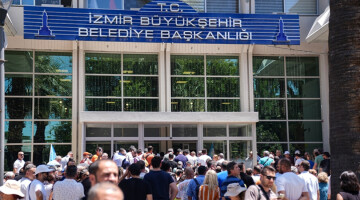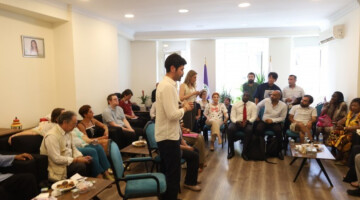All thirty defendants in the Yüksekova "KCK trial" were sentenced to long prison terms on Friday. As it has now turned out, one of the convicts is HDP politician Ahmet Öner. Öner was responsible for contact with the population in the HDP association of the province of Hakkari and was considered a leading figure with great popularity in Kurdish society. He died of stomach cancer in 2017 and has now been posthumously sentenced to eight years and nine months’ imprisonment for membership of an illegal organisation.
In the same trial, Remziye Yaşar, the deposed co-mayor of Yüksekova District, was sentenced to seventeen years and six months in prison. The court imposed equally high prison sentences on Vahit Şahinoğlu and Mehmet Çapraz. The remaining 26 defendant journalists Necip Çapraz and Tacettin Safalı, Yılmaz Güneyli, Yılmaz Gözyan, Abidin Eniş, Naif Öztekin, Nazif Ataman, Arif Karay, Sabri Tümen, Abdülkerim Akdoğan, Songül Öztanmen Abdülhalik Özdel, Metin Yaşar, Muhyettin Önal, Nahide Yıldız Pulat, Hurşit Altekin, M. Emin Seven, Hüsnü Beşer, Abdülmenaf Düzenci, Abdurahman Gemicioğlu, Ruken Yetişkin, Cemil Bor, Hüsnü Bulgan, Seracettin F Önal received sentences of eight years and nine months. The court ruled they have to sign up to the police regularly because of the risk of escape.
Background
Gever's KCK proceedings had been going on since January 2012. The wave of repression against alleged members of the Kurdistan Society (KCK), the umbrella organization of the Kurdish liberation movement, began on 14 April 2009. Local elections had taken place in Turkey two weeks earlier, and the pro-Kurdish party DTP (Democratic Society Party) was able to almost double the number of its mayors. In the same year, in December, the DTP was banned by a decision of the Constitutional Court on account of terrorist allegations.
The "KCK operation" began with the arrest of a number of Kurdish politicians and those in charge of civil society organisations. The repression hit all areas of social life in waves and also affected mayors, trade unionists, journalists, defenders of human rights and lawyers. At the end of the operation in 2011, around 10,000 people had been arrested on suspicion of membership in the KCK. Many of the victims were sentenced to long prison terms.











